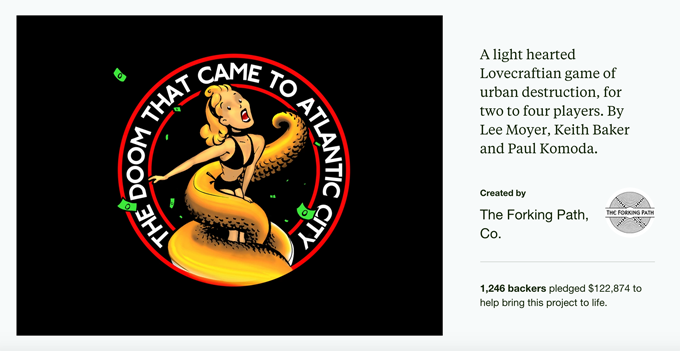FTC Announces First-Ever Settlement Over A Failed Crowdfunded Project
 Today is an important date in the histories of both consumer protection and crowdfunding: For the first time, the Federal Trade Commission took legal action against someone who used Kickstarter to fund a project that they didn’t produce. That’s the good news. The bad news is that since the man behind the scheme has no money to distribute to backers, the settlement doesn’t actually do anything for people who backed The Doom That Came To Atlantic City.
Today is an important date in the histories of both consumer protection and crowdfunding: For the first time, the Federal Trade Commission took legal action against someone who used Kickstarter to fund a project that they didn’t produce. That’s the good news. The bad news is that since the man behind the scheme has no money to distribute to backers, the settlement doesn’t actually do anything for people who backed The Doom That Came To Atlantic City.
This saga dates back to 2012, when a new game company, The Forking Path, run by Erik Chevalier, announced that it would be crowdfunding a cool board game that combined the science fiction of H.P. Lovecraft with the classic game Monopoly.
The campaign raised 350% of its goal — neat! Only the game never shipped. The project creator claimed that legal problems with Hasbro, the company that owns the rights to Monopoly, held it up. Sounds plausible enough, except for how it isn’t true.
The FTC found that this was not true, and that the project creator actually had used the funds for things other than printing up board games and casting figurines: the agency says that he spent it all on “unrelated personal expenses such as rent, moving himself to Oregon, personal equipment, and licenses for a different project.”
He also owes backers the promised refunds: $111,793.71, to be precise, but that judgement has been suspended because he doesn’t have the money to send the refunds. If the FTC discovers that he has money that he’s concealing, the judgement will be un-suspended, and he’ll owe the entire amount to jilted Kickstarter backers.
Under the terms of the settlement, the game’s creator is prohibited from conducting any more misleading crowdfunding campaigns, or employing anyone to run a misleading crowdfunding campaign in the future. That’s good, and it might cheer up backers, but doesn’t help them in the end. No, another game company did that, not a government agency.
The hero of this crowdfunding economy disaster is Cryptozoic Entertainment, the company that later put out the game after the Kickstarter-funded scheme collapsed and the rights reverted to the people who originally designed it. They sold copies of the game, which is great, but they also offered free copies to people who backed the original version on Kickstarter, a wonderful gesture.
PROPOSED STIPULATED ORDER FOR PERMANENT INJUNCTION AND MONETARY JUDGMENT [FTC]
Kickstarter-funded board game cancelled a year after raising over $100,000 [The Verge]
Want more consumer news? Visit our parent organization, Consumer Reports, for the latest on scams, recalls, and other consumer issues.

